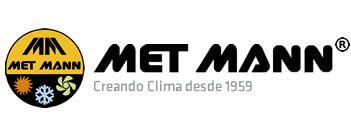In recent years, systems based on evaporative cooling such as cooling towers or evaporative condensers have been implemented in sectors such as industrial cold, given their broad advantages in terms of efficiency and cost savings. In this article we will detail all the characteristics and advantages of these systems. Keep reading to know them.
How does evaporative cooling work?
Evaporative cooling systems are based on a physical principle used since ancient times, by civilizations such as the Greek, Egyptian or Arabic that used the process of water evaporation to reduce the temperature of the surrounding environment, generating an exchange of energy with the air. .
It uses a dynamic found in nature that is characterized by collecting dry and hot air and passing it through a cooling panel with cold water, which causes it to evaporate and the temperature to drop, along with the thermal sensation. A method similar to the one our body uses to cool the skin by evaporating sweat from the skin.
Despite using only water for the air cooling process, it is reused up to 95% by evaporating a small amount and removing another to avoid the accumulation of salts. The air that is reintroduced after being cooled produces a phenomenon known as the “sea breeze” effect, creating a cleaner and fresher environment.
Direct evaporative cooling
The air is introduced directly to the space to be cooled after passing through the evaporator that cools and humidifies it. This system is particularly effective when the outside air is hot and dry or in the presence of heaters.
Indirect evaporative cooling
Consider that the air passing through the evaporator, subtracts the heat from an exchanger, this process cools the air, but does not humidify it. Both airs are separated from each other, therefore the purity of the air is intact. This system is perfect when the outside humidity is already high.
Furthermore, by not releasing water vapor in the refrigerated environment, it does not require any humidity control.
Advantages of evaporative water cooling
Refrigeration systems through evaporative water cooling represent an evolution in the air conditioning and cooling of rooms, with a series of important advantages that are detailed below:
-
Energy saving
One of the most important advantages of these systems is their high energy savings. Evaporation removes a lot of heat so the air flow required to cool the environment is lower. Compared to traditional heat exchange systems, systems based on evaporative cooling can achieve energy savings of up to 45%. -
Respect for the environment
When using water condensation there is hardly any environmental impact, since substances that can cause an impact on the ecosystem are not included, reducing the greenhouse effect and limiting indirect CO2 emissions. (Eliminates from the process substances such as CFCs, HCFCs, HFCs that do have an impact on the state of the ozone layer).
-
Open space functionality
It is possible to install these systems in open places or rooms, unlike other cooling systems that circulate the air and limit their efficiency to closed spaces. As an alternative to air conditioning, these systems work best with the windows open, creating a pleasant stream of fresh air. -
Great ability to regulate temperatures
These systems are capable of reducing temperatures indoors by up to 14ºC in climates with a mean relative humidity of 20% -30% and 5ºC in more humid climates, with relative humidity of 70% -80%.
-
Does not affect legionella
These systems, since they cool the air by contact and not by generating aerosols, are not affected by Legionella, so they do not have to be subjected to health controls unlike other types of equipment.
-
Add moisture in dry climates
By expelling air with a higher concentration of relative humidity, they provide a sensation of considerable comfort in dry environments.
-
Renew the indoor air
These systems completely renew the air in the room with clean, fresh and filtered air. Eliminating possible fumes and odors.
-
Less acoustic impact
Evaporative cooling equipment is particularly quiet compared to other systems.
Evaporative cooling applications
Poultry industry
This type of cooling system is a key element in poultry houses, especially during the warmer months of the year. By reducing the ambient temperature of the house, problems related to thermal stress are reduced.
Farming industry
Inside a greenhouse it is important to maintain a constant air temperature to maximize production.
Swine industry
Within a pig facility, maintaining a constant quality air temperature is of great help for the comfort and production of the animals.
Dairy industry
Heat stress in cows can lead to decreased milk production. In such a way that a system with a large cooling capacity like this one minimizes the loss of production during the highest temperature peaks that occur in some months of the year.
Undoubtedly, the use of this type of technology can be of great help in terms of reducing air conditioning costs, energy savings and sustainability.
At MET MANN we are professionals in evaporative industrial air conditioners and experts in adapting to the needs of each project. Do not hesitate to contact us without obligation to advise you on the most advanced technology in evaporative cooling systems … and make your facilities more efficient than ever.


